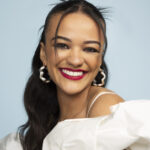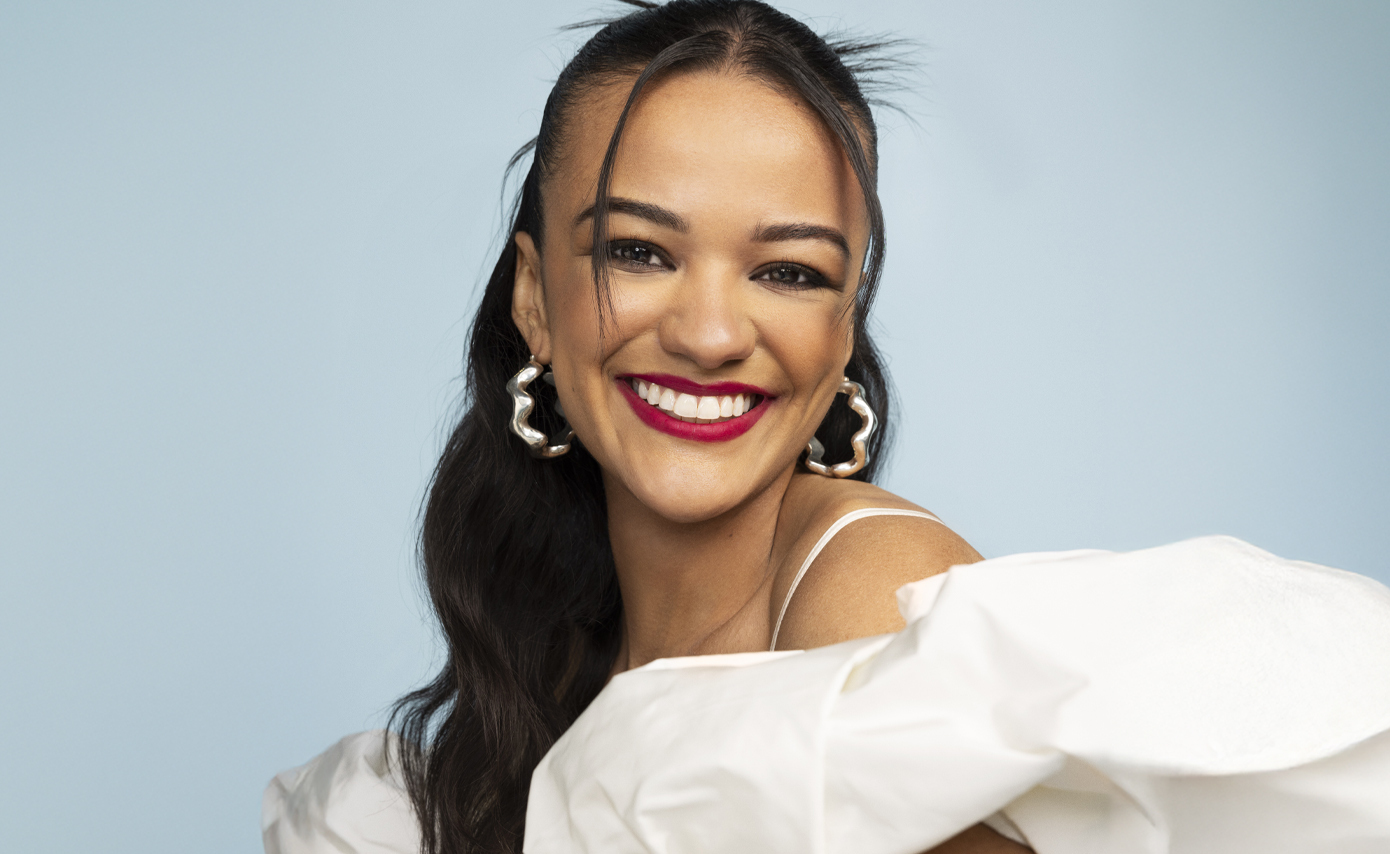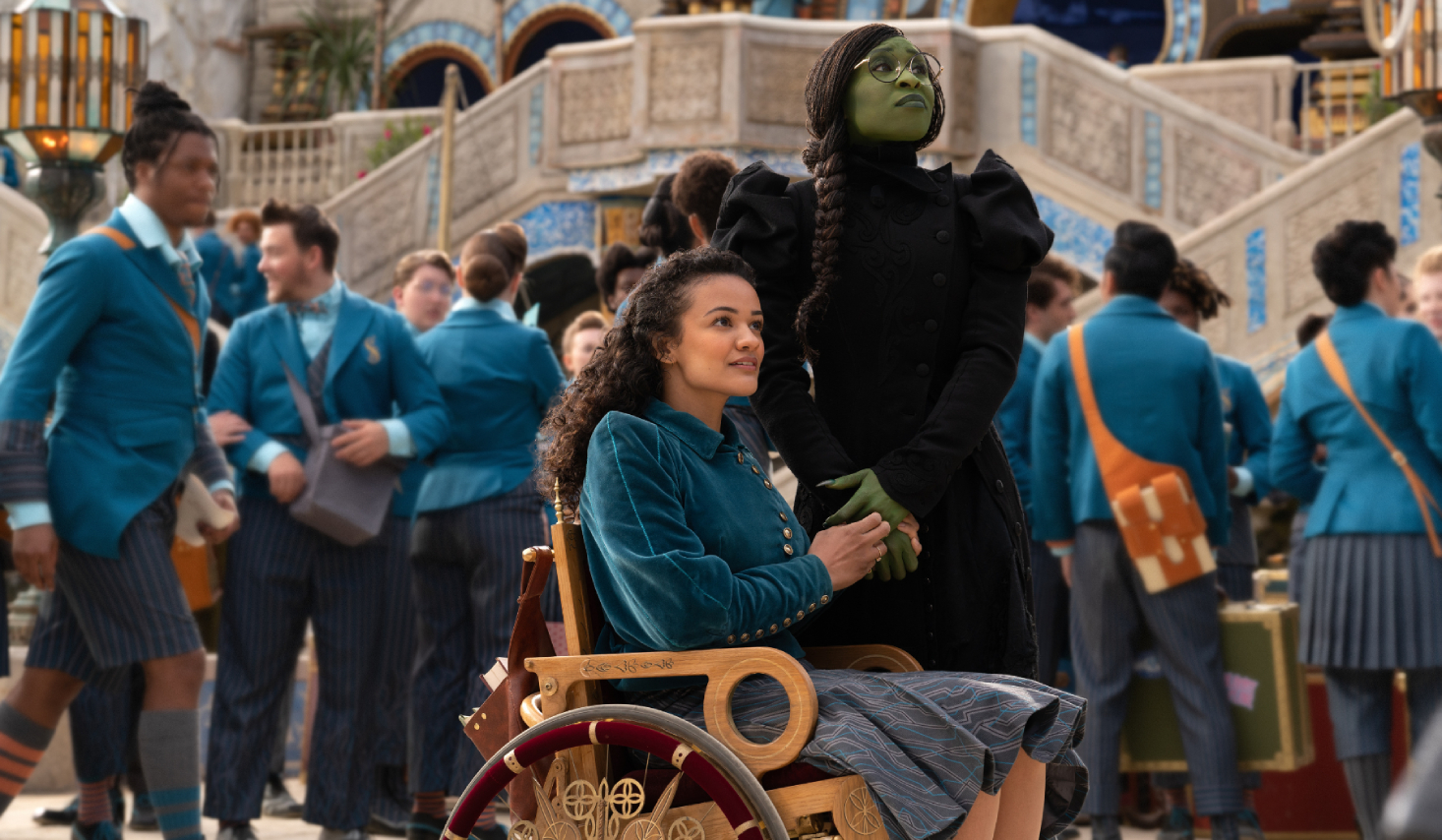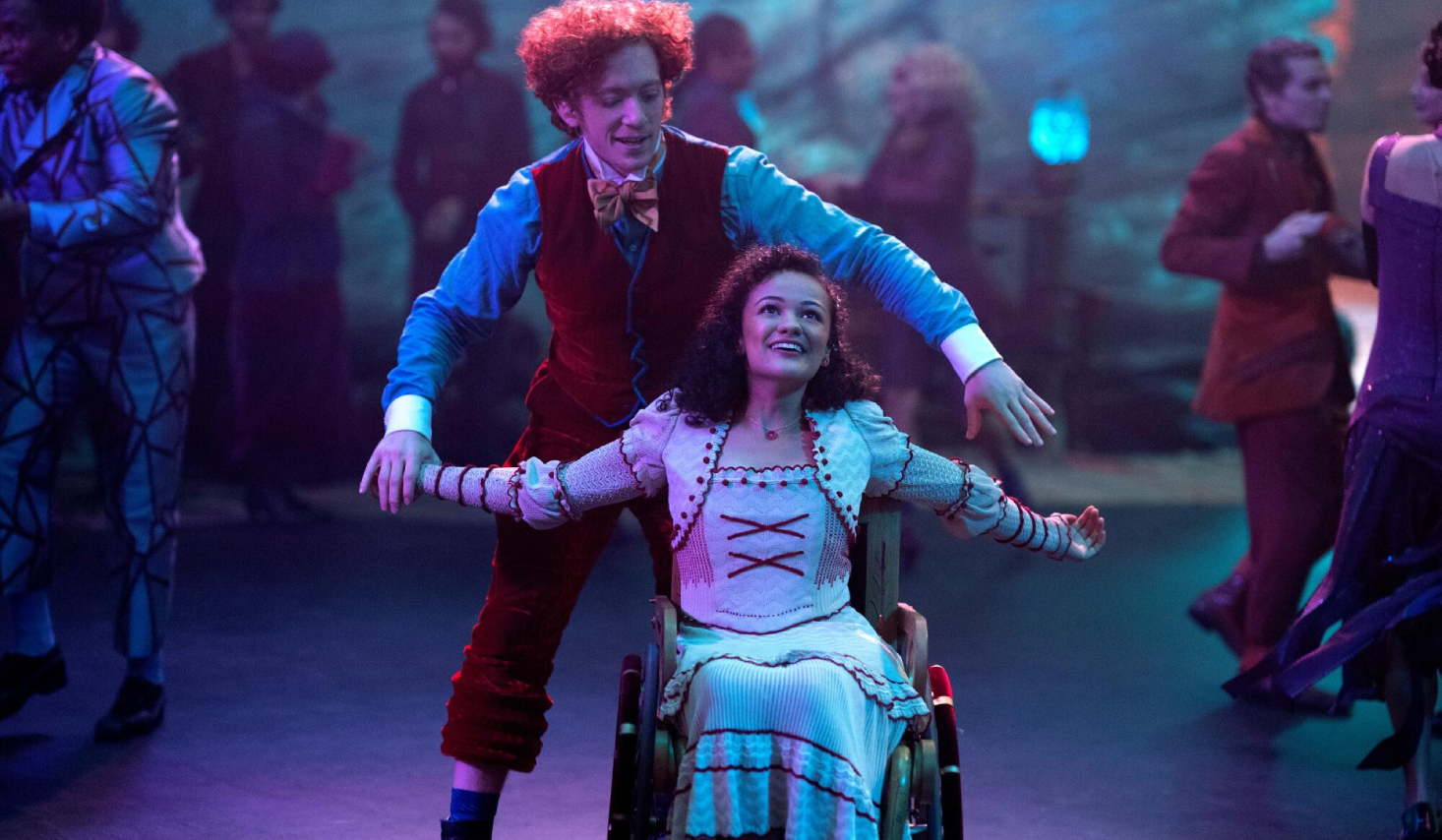
Marissa Bode discusses her historic film debut in Wicked and why “caring about disability and inclusion benefits everybody”.
WORDS BY SAM DAMSHENAS
PHOTOGRAPHY BY SAMI DRASIN

“If it sets in that this is real, I might lose my mind a little bit,” says Marrisa Bode. In Wicked – her feature film debut! – the 24-year-old has made history as the first actress with a disability to play Nessarose, Elphaba’s fiercely independent sister and Shiv classmate who just-so happens to be wheelchair-bound. While no one should be defined by their disability – as she says, a wheelchair is an “assistive device” in similar vein to glasses – Bode is using Wicked’s press tour to “scream from the rooftops” about much-needed accessibilities for people who are disabled and to fight for industry “inclusion”.
“I want to speak directly to disabled people and say that you can be in spaces, a lot of spaces, so don’t let anybody tell you that you’re too much or that accommodations can’t be made,” Bode tells GAY TIMES. “Fight for yourself, fight for your rights. Don’t let people tell you that it’s not possible.
As well as being the first actor in a wheelchair to play Nessarose, Wicked marks a watershed moment for Hollywood as it will be one of the – here’s that word again – first blockbusters to spotlight a disabled character to this extent. As a result, Nessarose will inevitably inspire countless people with disabilities who have never seen themselves portrayed this authentically on-screen. Bode says: “For me to be that for so many – not even just young kids in wheelchairs, but people in wheelchairs in general – it means the world to me. It’s surreal that it’s me.”
Here, Marissa Bode discusses her lauded (and more progressive) depiction of Nessarose in Wicked, what it was like to act opposite Cynthia Erivo, Ariana Grande, Jonathan Bailey and more in – it bears repeating – her! first! film! and the need for more disabled creatives in every aspect of the entertainment industry. As a queer person chatting with a queer publication, you can also expect a bit of rainbow talk.
Marissa, it’s time! How are you feeling?
It’s wild. I grew up loving The Wizard Oz and the magic, the colour and the whimsy. I am a sucker for whimsy. To see a lot of that transferred into the film itself, with nods to The Wizard of Oz, is so cool. “Cool” isn’t even the right word. I don’t know if there is a word to describe being part of something so great. I’m really excited for the world to be part of this magic.
Wicked is an instant classic, and I don’t think there’s a film in recent memory that has been cast as perfect as this.
I remember [director] Jon [M. Chu] saying that one of his goals is for this to be a classic and The Wizard of Oz for this generation, which is super hard to live up to because so many people hold that dear to their heart, including me. The cast as a whole has been nothing but kind and great to me. I don’t even need to say it, but everyone is genuinely so incredibly talented. I couldn’t agree with you more, that it is perfectly cast and everyone truly is their role in the film. It doesn’t feel like I’m watching Ari as Glinda. I’m like, ‘That is Glinda.’ I’m not watching Cynthia as Elphaba. That is Elphaba.
As a lifelong fan, can you talk to me about your first memories of Wicked and The Wizard of Oz, as well as Nessarose?
One day at school one of my besties, who I love dearly, was wearing a Wicked jacket and I had no idea what it was. She started describing it and I was like, ‘…amazing.’ Then, it was touring in my area and my mom had surprised me with tickets. It was so sweet and amazing. I believe I was 11 or 12 at the time. When I saw the musical I loved the whimsy of it all and thought, ‘This is such a great story, and gives so much more context to the [Wizard of Oz] characters and how we villainise people.’ Of course, seeing Nessarose on stage, somebody in a wheelchair, was really cool for me. I had never seen anything like that before. Obviously, when I learned this actress wasn’t actually in a wheelchair or physically disabled in any way, it was disappointing for me. I was like, ‘Man, is there a place for me? Is there really no place for authentically cast disabled people?’ The musical as a whole is obviously lovely and wonderful, but it would’ve meant the world to me to see somebody authentically cast that was in a wheelchair. So, for me to be that for so many – not even just young kids in wheelchairs, but people in wheelchairs in general – it means the world to me. It’s surreal that it’s me.
You’ve even got your own Barbie!
Yeah! My partner keeps asking me, ‘How are you not freaking out about the Barbie?’ and I’m like, I’m telling myself that this is a simulation and none of this is real because if it sets in that this real, I might lose my mind a little bit.’
Can you talk to me a little bit more about what it means for you to be that representation? How you will be the representation you never had for so many?
I’m at a point in my life where I’ve learned so much, not only about my disability, but so many other disabilities. I feel like I’ve made a community. I have a number of friends with various disabilities, and so it’s also been a journey to love myself and accept my disability as well; that it’s not this huge thing that everyone makes it out to be. It’s not a huge tragedy to be in a wheelchair. A wheelchair is an assistive device. I always like to make the analogy of glasses, because I think it’s very true that glasses obviously help people see better and nobody’s making a big deal like, ‘You’re wearing glasses, bless your heart! You’re so special! You’re so strong for wearing glasses, good for you!’ It’s literally the same thing as a wheelchair. I’m literally sitting down, that’s it. It’s an assistive tool to help me move throughout the space. For me, it’s no deeper than that. Obviously, accommodations are super important and I don’t think people need to ignore the disability because, when you ignore the disability, it’s harder for accommodations to be made and for inclusion to happen. I just don’t think it’s something that needs to be pitied or made a fuss over. We’re just human beings. We’re just out here existing.
I stalked your Instagram and the fan comments are so beautiful. It’s wonderful to see how many people you’ve already represented. What is that like for you to see?
I’ve definitely gotten emotional a number of times when I get comments, specifically from disabled people expressing how excited they are to see somebody that looks like them, and how this representation helps them feel seen. Again, I grew up not really seeing that representation and if I did, it was for one special episode and you never saw that character again. So, to be in a blockbuster movie like this, it’s just so important. I want to speak directly to disabled people and say that you can be in spaces, a lot of spaces, so don’t let anybody tell you that you’re too much or that accommodations can’t be made. Fight for yourself, fight for your rights. Don’t let people tell you that it’s not possible. Obviously, all disabilities are different and there are going to be some limitations here and there, but a lot of the time there are ways around it if the proper accommodations are made. I will be screaming that from the rooftops throughout this press tour.


What kind of impact would you like Wicked and your portrayal of Nessarose have on the industry moving forward?
I would like people to know that it is possible, and you should be including disabled people. Including disabled people is the bare minimum. We are people existing in everyday life, where we make up quite a bit of the population. Everybody should care about disability because the disability community is the one marginalised community that anybody can join at any time. You don’t know what tomorrow brings. You could experience a medical emergency and be disabled. So, I think that caring about disability and inclusion benefits everybody. So, I hope this sets a precedent that it’s possible to, not only include disabled people on screen, but provide accommodations. The Wicked team was incredible at that. If there isn’t necessarily a huge budget like Wicked, ask the disabled person. Always ask the disabled person how you can make a change without a big budget. I’m sure you’ll find the answer as it’s not as difficult as people make it out to be. I guess the one thing I also want to scream is: never just assume about disabilities. Always ask. If we do both of those things, a lot of progress can be made.
As well as providing representation for people with disabilities, Wicked includes allegories for race and queerness through the character of Elphaba…
This movie is for everyone, but the girls and gays are definitely going to be seated for sure! I’m telling you, my whole queer friend group has already bought their tickets. The queer community has been drawn to flamboyant colours and brightness and, as you said, there’s themes of race and queerness. Staying true to yourself and speaking up for others is one of my favourite themes in Wicked. The theme of friendship and finding that community is also especially important in a world where LGBTQ+ people still aren’t accepted in a lot of places, or don’t have that support system. Having a chosen family and finding that community is really important, and a theme that a lot of people can relate to.
Before Wicked, you had only acted in short films, right?
Yeah, and they’ve all been really small, quite local. All of them were in Wisconsin and produced and written by my dad, who is a writer. Then I’ve made short films of my own, and those have been self-made projects. The pandemic really harnessed that creativity in me, especially making and creating something on my own. So, Wicked is my first big girl thing! What a way to step into my career like this? It’s absolutely bananas, how incredibly lucky am I? Infinity lucky, is the answer. Overwhelming, I’m not going to lie, but I’m so incredibly grateful to be a part of this and to bring such an incredible film to a new generation.
Marissa, this was your first film and you slayed it. Honestly, you were so natural on the screen.
That’s so sweet, thank you. I was cast in this, basically, a year after graduating college, so it feels like everything happened really fast for me. I keep saying this, but it really did install that imposter syndrome in me. Especially going to a performing artist college where there were so many incredible talents and, a lot of them have gotten work, but… I don’t know. To be in something this big so soon, oh my god.
That imposter syndrome needs to be gone. She is…
Taking the piss, as British people say!
She’s taking the f***ing piss and she needs to get going.
That voice has definitely quietened. It’s still a work in progress, so she’s still there. And I know a lot of actors and artists experience that. I have such a great support system around me that helps me navigate that.
I have to say, I’m excited about your post-Wicked career. You mentioned how you self-made a lot of short films, so are you aiming to explore other avenues such as writing, directing and producing? Is that something you’ve thought about?
It’s intimidating because I’ve only directed myself, really. In college, we would rotate; some people would be actors and then others directors, so we all got a chance to experience different parts of [the industry], which was helpful. I think, as an actor, it’s important to experience it all. We also wrote as well, so I’m definitely not opposed to directing and definitely writing more, although I’m a perfectionist when it comes to my writing and sharing my writing. But, there needs to be a lot more disabled people in the writers’ room when writing disabled characters, or writing characters in general, so that the focus isn’t on their disability. They’re just existing, because that’s our truth and our reality. Disabilities are a huge part of us, and we need to tend to things within our disabilities on a day-to-day basis, but it’s not what we think about every waking day. It’s not in every single one of our conversations.
That’s what Wicked does beautifully, Nessarose isn’t defined by her disability.
That’s actually what I love in this version, which is slightly different from the musical stage version. It shows Nessa in her friendships and her relationship with Elphaba. And Elphaba isn’t necessarily protective because she thinks Nessa is incapable, it’s moreso because her dad is protective and he’s telling Elphaba to do so. Whereas in the stage version, everybody – or most people – look at Nessa like she’s not capable. Highlighting that Nessa is perfectly capable [in the film] as a human being just existing and going to college like everyone else is important.
Wicked is out now.
The post ‘This must be a simulation!’: Wicked’s Marissa Bode on making history as Nessarose appeared first on GAY TIMES.

0 Comments